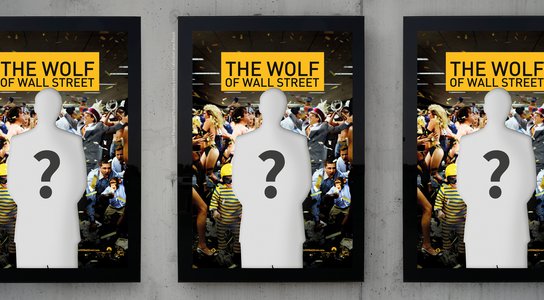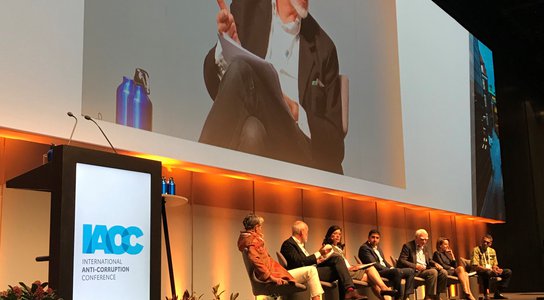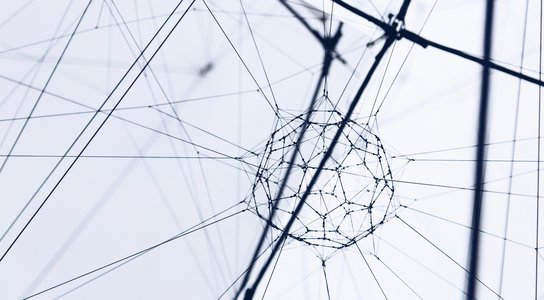Exposing corruption sounds great, doesn’t it? Corruption drives some of the most appalling abuses of power in the world, encompassing everything from crimes against humanity to environmental destruction, so campaigning against it can only be a good thing, can’t it? But when I was invited to speak on a panel at the International Anti-Corruption Conference in Copenhagen on the question of whether the fight against corruption threatens democracy, I had to think a little more deeply about the role corruption can play in destabilising and undermining democratic institutions. Maybe all of us at Global Witness had a bit of soul-searching to do about the impact of our work?
Round one: anti-corruption vs democracy
It’s clear from recent history – and indeed current campaigns – that public anger at corruption and the sense that politicians use their positions to either enrich themselves or reward a circle of cronies, can create space for populist politicians, including those standing on policy platforms that actively seek to curb democratic freedoms. Whether it’s the booming cries of “Drain The Swamp” at Trump rallies or the wild applause when Brazil’s leading Presidential candidate said he would shoot corrupt members of the opposition Workers’ party, it is true that voter alienation against a political class believed not to be ruling in the public interest has sometimes made the fight to expose corruption and the struggle to maintain or strengthen democracy uncomfortable bedfellows.
In Brazil, where the public head to the polls on Friday, 31% of the population identify corruption as the country’s no.1 problem, while 80% of Brazilians don’t believe enough has been done to fight it. Last year, almost half of Brazilians were in favour of restoring a military junta if corrupt politicians weren’t punished by the judiciary. Today, less than half of the country’s population believes that democracy is preferable to any other form of government. This declining trust in institutions has led Brazilians to consider their alternatives and they have turned, in vast numbers, to Jair Bolsonaro, a candidate who has praised military rule, is in favour of torture for members of the LGBT community, has pledged to “put an end to all activism”, and open up indigenous territories to mining and other economic activities.
At Global Witness, we are acutely aware of this tension and it is something we factor into our work. We aim to operate a “do no harm” policy and, although we expose corruption without fear or favour, we must also be careful not to inadvertently provide cover or bolster the efforts of those whose political positions are wildly antithetical to our overall mission of building a world that is more sustainable, more just and more equal.
Taking a global perspective
But this doesn’t feel like the whole story. I may be biaised but I simply don’t believe that anti-corruption campaigns are intrinsically threatening to democracy, or that they are somehow fated to benefit populists who are themselves likely to be corrupt.
Although we are certainly living in an era where anti-corruption rhetoric has been successfully hi-jacked by some of those with illiberal and undemocratic tendencies, taking a step back to look at the relationship between corruption and democracy at a global level, rather than through the prism of one or two challenging examples, offers some much needed perspective.
Corruption necessarily undermines democracy and the prospects of democracy.
Corruption is so much more than a rallying cry during election campaigns, more than a tool to smear opponents, more even than the important but rare prosecutions against politicians and business leaders who siphon off public money for their own use.
Corruption robs citizens of their votes, access to justice and freedom to express their views. If you are a politician who builds your power via corruption, you need to protect it by corrupting or otherwise neutralising public institutions and independent voices. If you don’t, you open the door to others to build a more legitimate political platform than your own from which to challenge you. If you are a political leader whose power is built on corruption, undermining the fabric of democracy is your day job.
We see this happening right now in the Democratic Republic of Congo and South Sudan. And in Cambodia, Hun Sen’s kleptocratic government has, in response to internal challenges and opportunities, abolished any opposition and become, or reverted to being, the dictatorship many suspected it always wanted to be.
Many of the countries worst affected by corruption may – for the wrong reasons – be inoculated against this problem
Part of the emerging thesis about the unintended consequences of the fight against corruption is that it can make citizens cynical and lower their expectations of standards of behaviour by politicians. But if their expectations are already pretty low, this isn’t such an issue.
Right now, in Angola President Lourenco is undertaking an anti-corruption drive. In Zimbabwe, President Mnangagwa is doing the same thing. Both men are the successors to leaders widely associated with severe levels of corruption. The chances of their anti-corruption campaigns falling short are quite high. But if they do fall short, it seems unlikely that most Angolans and Zimbabweans will be terribly surprised or that this will have much impact on the already weak democratic institutions.
Of course, it’s arguable that neither of these countries can be described as ‘proper democracies’. But, within this debate, it’s important to recognise not only when anti-corruption campaigns appear linked to the dismantling of democratic institutions, but also where there is little risk of this happening. If we extrapolate from Brazil and assume that fighting corruption poses an inherent risk to democracy, we risk undermining brave anti-corruption activists in countries like Angola and Zimbabwe whose work can only strengthen the democratic rights of their fellow citizens.
The fight against corruption can strengthen democracy
And this connects to the point that fighting corruption can help create the conditions for, or reinvigorate democracy. We can all think of instances where autocracies or full-on dictatorships are overthrown by citizens outraged by extravagant levels of corruption, usually alongside other grievances. In some of these cases, notably countries formerly part of the Soviet Union, and countries affected by the Arab Spring, there has been no immediate happy ending, with successor governments perpetuating corrupt activities. But I don’t think there’s too much doubt that the fight against corruption can help unseat despots and at least give citizens a shot at democracy where before they didn’t stand a chance.
There are also less spectacular examples where the fight against corruption gives democracy a shot in the arm. One recent example, I’d argue, is Malaysia. Most commentators agree that the exposure of the 1MDB case – a supernova in the galaxy of corruption scandals, has animated voters into ejecting a thoroughly corrupt government. They have replaced it with one that – despite the unexpected alliance that underpins it – so far seems likely to bring greater freedoms for the country’s citizens and perhaps a renewal of its arguably rather stagnant democracy.
So, where does that leave us?
After one fascinating panel session, I can’t claim to have all the answers. But my final thought to those who attended was:
“We mustn’t ignore some of the uncomfortable truths about how anti-corruption campaigns are sometimes used to undermine democracy…
But…
We need to acknowledge that situations differ around the world and, although this is an important debate for the transparency movement to have, it must not be allowed to dominate our work to the detriment of our active involvement in campaigning against some of the biggest global challenges we face; namely the rise of populism and, of course, climate change, which are both inextricably linked to corruption.”


